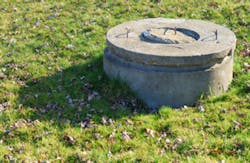NGWA recommends well owners to regularly check water
WESTERVILLE, Ohio — The National Ground Water Association (NGWA) encourages well owners to periodically test water for health risks as bacteria and nitrate are common in the environment, according to a press release.
Pathogens are disease-causing bacteria that can exist in well water under the right circumstances and nitrate, sometimes linked to animal or human waste, is typically found in rural areas because of fertilizer use, stated the release.
Potential sources of bacteria include: Runoff from woodlands, pastures and feedlots, septic tanks, sewage plants and animals, both domestic and wild, and pathways of bacteria into well water can be a result of reduced pressure or suction in water lines drawing soil water at the pipe joints and/or faulty sanitary seals in a well system, reported the release.
The release continued that in addition to fertilizers, animal and human waste, nitrate can be generated by decomposing plant and animal materials, septic systems, sewage, industrial effluent and landfills.
“We recommend that well owners test their water annually for bacteria and nitrate because of their widespread presence,” said NGWA Public Awareness Director Cliff Treyens. “Knowing whether or not you have a problem with bacteria or nitrate through valid laboratory testing is key to keeping your water safe.”
Read the entire release here.
